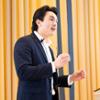Public Speaking
Since the earliest days of the College, students have been asked to develop their ability to communicate eloquently in a variety of contexts. Today, the Public Speaking Competition provides an opportunity for students to both hone and demonstrate those abilities while competing for more than $18,000 in prizes.
The 2026 competition will take place on Saturday, March 7, at 1 p.m. in the Chapel.
Public Speaking Prizes
The Public Speaking Competition is comprised of three endowed prizes. All currently enrolled Hamilton students are eligible for at least one prize and may compete for multiple prizes.
The McKinney Prize is awarded to one student in each class year for a persuasive speech. Typically, students compete within their own class year, though sometimes class years are combined if there is a limited pool of competitors.
The Clark Prize is limited to seniors and requires students to respond to a specific prompt in a persuasive speech.
2026’s prompt:
What can human failures teach us in the age of AI?
The Warren E. Wright Prize is limited to students who have taken a public speaking course; currently, Genres of Oral Communication qualifies. Students present an informative speech on the topic of their choosing and are challenged to respond to questions posed at the end of their speeches.
Speeches for each prize should be between 6 and 8 minutes. Speeches should be planned and rehearsed. Speakers may not use props, PowerPoint, or other aids, including in the form of clothing. All material must be your own without the help of AI.
2025 Winners






What advice would you give to future participants of the Public Speaking Competition?
“It’s a collaborative process and takes time. It was through multiple appointments with OCC tutors Lauren Prins and Tinashe Manguwa that I was able to receive the feedback that guided me through multiple iterations of my speech.”
“To not just rigidly follow advice about where to place your hands, how to stand, etc., but to figure out how to meld these guidelines with what felt natural and genuine to me. Everyone has their own unique way of being and communicating, and you don’t want to wipe that away.”
“Watch past winners of the speaking competition on YouTube. Take inspiration on what your speech can be about and how you can convey it.”
It took me a little while to decide whether or not I wanted to enter out of fear of judgement. So, my biggest lesson learned: take the risk, be vulnerable, and be honest!
“Prepare as much as you can, but when you step on stage, let go, trust yourself, and have fun. Most importantly, speak about what you’re passionate about. If your passion fuels your preparation, it will shine through in the Chapel.”
“Passion/emotion is everything. If you aren’t making your audience feel some type of emotion during your speech (laughter, sadness, sympathy, etc), then your speech isn’t going to be successful as it’s not really connecting with the audience.”
Contact
Office / Department Name
Oral Communication Center
Contact Name
Amy Gaffney
Oral Communication Center Director






